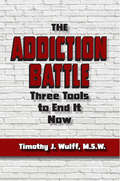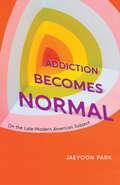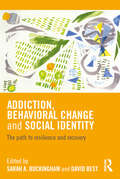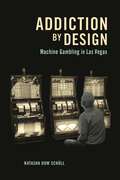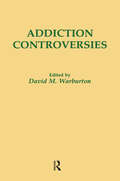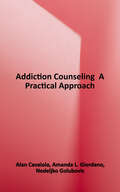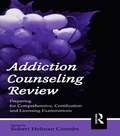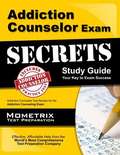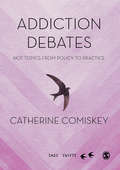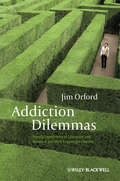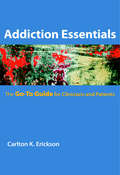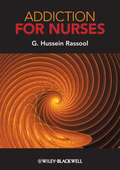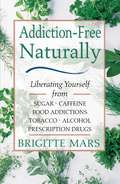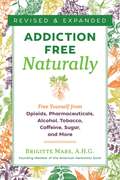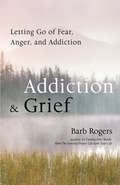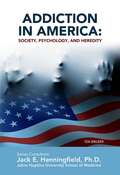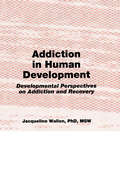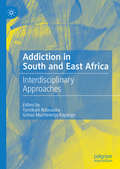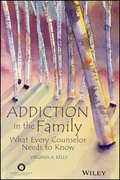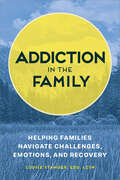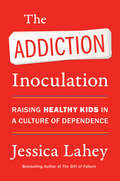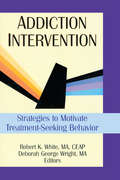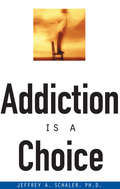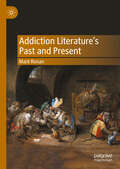- Table View
- List View
The Addiction Battle: Three Tools to End It Now
by Timothy J Wulff Timothy J. Wulff, M.S.W.Is every day a challenge as you wage your personal battle against addiction? If you've fallen into the addiction trap, you are not alone. It is estimated that one out of ten Americans is struggling with addiction. Author Timothy Wulff, M.S.W., is an addiction therapist who has spent more than a decade successfully treating individuals addicted to drugs and alcohol. To identify the source of addiction, Wulff focuses on beliefs about one's self that develop early in life and that eventually obscure the strong and positive true self, increasing susceptibility to addiction. In The Addiction Battle, Wulff will help you discover where your greatest strengths are buried and teach you how to use their hidden power to overcome addiction. Wulff will teach you how to redefine the terms anger, selfishness, and troublemaking, and make them key tools in shaping your actions from a new healthy perspective:•• Anger—It's a powerful emotion that can be used constructively to protect yourself.•• Selfishness—Healthy selfishness is good self-care. Without it, addiction continues.•• Troublemaking—the opposite of pleasing others, troublemaking helps you stand up for your own feelings, needs, and desires.Learning to use these tools, which are already part of you, will enable you to reclaim these inner strengths. Through the book's practical and sensitive pages, Wulff gives you a way to begin your life anew and triumph over addiction.
Addiction Becomes Normal: On the Late-Modern American Subject
by Jaeyoon ParkAddiction is now seen as an ordinary feature of human nature, an idea that introduces new doubts about the meaning of our desires. Over the last forty years, a variety of developments in American science, politics, and culture have reimagined addiction in their own ways, but they share an important understanding: increasingly, addiction is described as normal, the natural result of a body that has been exposed to potent stimuli. This shift in thinking suggests that addiction is a condition latent in all of us, a common response to a society rich in thrills. In Addiction Becomes Normal, Jaeyoon Park provides a history and critical analysis of the normalization of addiction in late-modern American society. By exploring addiction science, diagnostic manuals, judicial reform, and public health policy, he shows how seeing addiction as normal has flourished in recent decades and is supported throughout cultural life in the United States by the language of wellness, psychotherapy, and more. Building on Michel Foucault’s depiction of the human figure, Park argues that this shift reflects the emergence of a new American subject, one formed by the accretion of experiences. This view of the human subject challenges the idea that our compulsions reflect our characters, wills, or spirits. For if addiction is an extreme but ordinary attachment, and if compulsive consumption resembles healthy behavior, then desire is no longer an expression of the soul so much as the pursuit of a past reward. A perceptive work of recent history and political theory, Addiction Becomes Normal raises new questions about what it means to be human in America today.
Addiction, Behavioral Change and Social Identity: The path to resilience and recovery
by Sarah A. Buckingham and David BestChanging health-related behavior is for many people a lonely and isolating experience. Individual willpower is often not enough, particularly in addressing addictive behavior, but research increasingly points to the potential of group identity to shape behavior change and support recovery. This important collection explores the social and cognitive processes that enable people who join recovery groups to address their addictive issues. In an era of increasing concern at the long-term costs of chronic ill-health, the potential to leverage group identity to inspire resilience and recovery offers a timely and practical response. The book examines the theoretical foundations to a social identity approach in addressing behavior change across a range of contexts, including alcohol addiction, obesity and crime, while also examining topics such as the use of online forums to foster recovery. It will be essential reading for students, researchers and policy makers across health psychology and social care, as well as anyone interested in behavioral change and addiction recovery.
Addiction by Design: Machine Gambling in Las Vegas
by Natasha Dow SchüllAn anthropologist looks at the new "crack cocaine" of high-tech gamblingRecent decades have seen a dramatic shift away from social forms of gambling played around roulette wheels and card tables to solitary gambling at electronic terminals. Slot machines, revamped by ever more compelling digital and video technology, have unseated traditional casino games as the gambling industry's revenue mainstay. Addiction by Design takes readers into the intriguing world of machine gambling, an increasingly popular and absorbing form of play that blurs the line between human and machine, compulsion and control, risk and reward.Drawing on fifteen years of field research in Las Vegas, anthropologist Natasha Dow Schüll shows how the mechanical rhythm of electronic gambling pulls players into a trancelike state they call the "machine zone," in which daily worries, social demands, and even bodily awareness fade away. Once in the zone, gambling addicts play not to win but simply to keep playing, for as long as possible—even at the cost of physical and economic exhaustion. In continuous machine play, gamblers seek to lose themselves while the gambling industry seeks profit. Schüll describes the strategic calculations behind game algorithms and machine ergonomics, casino architecture and "ambience management," player tracking and cash access systems—all designed to meet the market's desire for maximum "time on device." Her account moves from casino floors into gamblers' everyday lives, from gambling industry conventions and Gamblers Anonymous meetings to regulatory debates over whether addiction to gambling machines stems from the consumer, the product, or the interplay between the two.Addiction by Design is a compelling inquiry into the intensifying traffic between people and machines of chance, offering clues to some of the broader anxieties and predicaments of contemporary life. At stake in Schüll's account of the intensifying traffic between people and machines of chance is a blurring of the line between design and experience, profit and loss, control and compulsion.
Addiction Controversies
by David M. WarburtonIn the past, the prototypes for characterizing drug use were heroin and cocaine, so that research has focused on possible commonalities between any substance and these drugs. Addiction controversies explores the problems of the commonalities approach by looking at dissimilarities as well. The first chapters of Addiction Controversies trace the development of modern medical attitudes to drug use and the current controversy over its decriminalization. The second set of chapters examines the extent to which drugs have common biological and sociological mechanisms of action and contrasts these explanations. The final chapters consider the extent to which the desires for different substances are the same and the biological and social explanations of relapse. Clinicians, researchers and students in all areas of substance use will be stimulated by these challenges to current thinking and will enjoy the comparative approach that is taken by the contributors to Addiction Controversies.
Addiction Counseling: A Practical Approach
by Alan Cavaiola Amanda L. Giordano Nedeljko GolubovicEquips the upcoming generation of counselors with crucial knowledge to skillfully treat both chemical and behavioral addictions <p><p>Grounded in leading-edge, evidence-based research, this hands-on text applies a step-by-step approach to addictions counseling. This book encompasses assessment, diagnosis, and treatment planning; case management; and relapse prevention, with an incisive focus on behavioral addictions and co-occurring disorders. The text covers all essential topics as outlined in the gold standard SAMSHA Counselor Training Manual. Included are detailed guidelines on how to write succinct treatment plans and conduct effective client sessions; case studies; role-playing exercises; and clinical applications to assessment and diagnosis, treatment planning, and case management. Notes from the Field" provides actual interviews with experienced clinicians working with a variety of client populations throughout the country. <p><p>Critical topics unique to the book include the role of neuroscience in addiction treatment, relapse prevention, and advocacy. In addition, the text offers specific chapters on behavioral addictions and co-occuring disorders as well as a separate chapter on multicultural counseling covering gender, racial, ethnic, sexual orientation, age, religion, and disability considerations. It is also distinguished by an abundance of downloadable forms and documents. Pedagogical elements to help learners process and apply concepts include learning objectives, terms to know, learning activities, recommended resources, and chapter summaries. Faculty aids include an instructor's manual with sample syllabi, CACREP mapping tools, test bank, and PowerPoint slides. This essential resource will be valued as a primary textbook for any course that focuses on addiction counseling and treatment. <p><p>Key Features: <p>•Describes a variety of etiological models and how they become a means of assessing biopsychosocial risk factors <p>•Delivers step-by-step guidelines on how to write concise treatment plans and for conducting effective treatment sessions <p>•Devotes a chapter to motivational interviewing to promote willingness to change <p>•Includes cutting-edge research pertaining to neuroscience and its applications and evidence-based treatment practices <p>•Provides separate chapter on multicultural counseling and substance use disorders among people of diverse races, ethnicities, genders, class, ages, and spirituality <p>•Offers real-world insights with "Notes from the Field" feature <p>•Facilitates practical application through role play exercises, treatment technique and assessment case examples, biopsychosocial assessment guidelines, how to provide client feedback, and more <p>•Includes multiple digital downloadable tools and purchase includes digital access for use on most mobile devices or computers
Addiction Counseling Review: Preparing for Comprehensive, Certification, and Licensing Examinations
by Robert Holman CoombsAddiction Counseling Review: Preparing for Comprehensive, Certification, and Licensing Examinations offers a clear, readable overview of the knowledge and skills those training as alcohol or other drug counselors need to pass their final degree program, certification, and licensing examinations. It is organized into six sections: Addiction Basics, Personality Development and Drugs, Common Client Problems, Counseling Theories and Skills, Treatment Resources, and Career Issues. Each chapter includes challenging study questions that enable readers to assess their own level of understanding, including true/false, multiple choice, and provocative discussion questions. Each chapter also provides a glossary of key terms and, in addition to references, annotated suggestions for further reading and Web site exploration.This book will be a resource to which students and trainees will go on referring to long after it has helped them through their examinations. In addition, faculty and established professionals will find it a useful one-stop summary of current thinking about best practice.
Addiction Counselor Exam Secrets Study Guide: Addiction Counselor Test Review For The Addiction Counseling Exam
by Addiction Counselor Exam Secrets Test Prep StaffAddiction Counselor Exam Secrets helps you ace the Addiction Counseling Exam, without weeks and months of endless studying. <P><P>Our comprehensive Addiction Counselor Exam Secrets study guide is written by our exam experts, who painstakingly researched every topic and concept that you need to know to ace your test.
Addiction Debates: Hot Topics from Policy to Practice (SAGE Swifts)
by Catherine ComiskeyAddiction Debates explores the tumultuous landscape of addiction research, policy and practice. Covering all the 'hot topics' of the day in a balanced and informative manner, Comiskey provides international perspectives on each topic, stimulating debate and discussion via the different approaches taken globally. Considering the complexities of debates around legalisation, rehabilitation, abstinence, harm reduction, and the current opioid epidemic, this SAGE Swift also looks into the health and social concerns related to drug consumption. Less-often debated topics include the ageing population of people who use drugs, the rights of the child of parents who use drugs, and the pressure these unique factors put on public health and associated services. A relevant text for a range of disciplines and people, sure to inform, challenge and continue the debate.
Addiction Debates: Hot Topics from Policy to Practice (SAGE Swifts)
by Catherine ComiskeyAddiction Debates explores the tumultuous landscape of addiction research, policy and practice. Covering all the 'hot topics' of the day in a balanced and informative manner, Comiskey provides international perspectives on each topic, stimulating debate and discussion via the different approaches taken globally. Considering the complexities of debates around legalisation, rehabilitation, abstinence, harm reduction, and the current opioid epidemic, this SAGE Swift also looks into the health and social concerns related to drug consumption. Less-often debated topics include the ageing population of people who use drugs, the rights of the child of parents who use drugs, and the pressure these unique factors put on public health and associated services. A relevant text for a range of disciplines and people, sure to inform, challenge and continue the debate.
Addiction Dilemmas
by Jim OrfordAddiction Dilemmas explores the impact of addiction on those closest to the individuals affected and their families. Drawing on a wide range of sources, the book discusses the stresses and strains that family members are subjected to, the dilemmas that they face, and the coping strategies that they have found useful.Draws on a unique breadth of material to illustrate the dilemmas faced by family members in coping with a close relative's addictionRaises questions and points to controversies rather than dispensing prescriptive "one size fits all" adviceBrings together accounts from research interviews, biography, autobiography and relevant fiction in a creative and original wayTackles common misunderstandings at public, practitioner, scholarly and policy levels about the predicaments that family members commonly find themselves inEach chapter closes with a commentary, questions and exercises designed to further develop understanding for professionals and students
Addiction Essentials: The Go-To Guide for Clinicians and Patients (Go-To Guides for Mental Health)
by Carlton K. EricksonAn up-to-date guide to the causes, diagnosis, and treatment of addictions. Whether it's to caffeine, nicotine, or alcohol, many of us suffer from at least one addiction. Carlton K. Erickson presents a comprehensive overview of the various types of addictions--covering both substance and nonsubstance addictions such as gambling, Internet use, and video games--and their diagnosis and treatment. This book sheds light upon the biological and environmental factors that cause addiction, reviews the various types of substance and nonsubstance addictions, and offers clinicians and patients hope for recovery. Erickson examines alcohol, drugs that speed us up, drugs that slow us down, and how to recognize addictive behavior--such as exercise and videogame addiction--which may be less obvious. Other topics covered include alcohol and other drug pharmacology, neurophysiology of brain pathways, alcohol and drug interactions, adolescent drug use, drug use differences by gender and culture, and visual signs of drug use. Erickson presents various therapeutic methods for addressing addiction, including pharmacological interventions, individual or group therapy, twelve-step programs, and therapy involving family members. Finally, he reflects on the involvement of family and the risks and consequences of relapse. Written by one of the country's leading addiction specialists, this accessible, comprehensive book, is a go-to reference for your questions about addiction, and a friendly introduction to the diagnosis and treatment options.
Addiction for Nurses
by G. Hussein RassoolNurses are acknowledged as key agents in addressing alcohol and drug misuse at individual, family, and community levels. Addiction nursing is central to the assessment, management, and care of people with problematic use of psychoactive substances (both legal and illegal). Work takes place in a wide range of settings, from traditional hospital clinics and wards to community locations such as police custody suites and needle exchange facilities. Addiction for Nurses is a comprehensive textbook for students, explaining the role of the nurse at each stage of intervention. Early chapters approach the subject from sociological, historical, and cultural perspectives, covering significant topics such as the nature of addiction, its social context, and addiction theory. The book then presents vital information about each of the main areas of addiction (nicotine, alcohol, opiates, cannabis, psychostimulants, and hallucinogens) with clinical and practical guidance on recognition, assessment, and treatment intervention strategies. Further chapters consider dealing with emergencies, blood-borne viruses, harm reduction, and work with specific client groups (for instance, black and ethnic minority communities, or those with special needs). This book is an essential resource for all those who come into contact with alcohol and drug misusers and for specialist addiction nurses preparing for practice in this complex and rewarding field.
Addiction-Free Naturally: Liberating Yourself from Sugar, Caffeine, Food Addictions, Tobacco, Alcohol, and Prescription Drugs
by Brigitte MarsThe first comprehensive guide to overcoming addictions by using natural remedies that rebuild health for both body and mind from the inside out. • Covers a full range of natural remedies, including herbs, homeopathy, aromatherapy, flower essence remedies, color therapy, acupressure, and more. • Addresses many different substances, such as caffeine and chocolate, and discusses how the body deals with withdrawal, detoxification, and repatterning. • The natural remedies included in this book can be used in conjunction with conventional therapies. • By well-known author Brigitte Mars, who has 30 years of experience with natural therapies and is the formulator for UniTea Herbs. Addiction is one of the most serious health issues facing our twenty-first century culture. Modern lifestyles encourage us to consume excessive amounts of caffeine and sugar and to unwind from our stressful lives with tobacco or alcohol. Left untreated, some addictions can cause metabolic damage, leading to heart disease, high blood pressure, and immune disorders--as well as causing nutritional deficiencies, fatigue, and depression. Addiction-Free--Naturally offers gentle but effective ways to ease cravings and nourish the body, as well as information on cleansing the body of accumulated toxins and using natural remedies for stress relief. The remedies can be used in conjunction with conventional therapies, such as psychotherapy or Alcoholics Anonymous meetings. The author also offers advice on designing a personal program to break addiction and finding a health care professional or program to offer expert guidance as you walk the road to recovery.
Addiction-Free Naturally: Free Yourself from Opioids, Pharmaceuticals, Alcohol, Tobacco, Caffeine, Sugar, and More
by Brigitte MarsA guide to designing a personal program to break your addictions safely, gently, and naturally • Shares herbs, supplements, natural remedies, and alternative practices that can help liberate you from habitual substance use, ease the withdrawal period, cleanse the body of toxins, and combat depression, anxiety, fatigue, and stress • Offers specific advice and remedies for individual addictive substances and behaviors, including sugar, caffeine, alcohol, opioids, tobacco, and tranquilizers • Explores the potential of psychedelic therapy for overcoming addiction and addresses how cannabis can be of benefit for recovery, without being misused Addiction affects more people than any other disease. Breaking a habit can be daunting--it&’s hard to know where to begin beyond quitting &“cold turkey.&” But just as habits can be acquired, they can be broken. Others have done it, and so can you! In this holistic guide to beating addiction, Brigitte Mars details how to replace negative habits and behaviors with positive healthy ones and safely support your body, mind, and spirit for a successful recovery. The author shares specific herbs, supplements, homeopathic remedies, flower essences, behavioral therapy, and alternative practices, such as meditation and yoga, that can help liberate you from habitual substance use and ease the withdrawal period as well as methods for cleansing the body of toxins and healthy ways to combat depression, anxiety, fatigue, and stress. She looks in depth at individual addictive substances and behaviors, including sugar, caffeine, alcohol, opioids, tobacco, and tranquilizers, offering specific advice and remedies for each. She shows how each technique can be used in conjunction with conventional therapies, such as psychotherapy, methadone, or Alcoholics Anonymous. Drawing on recent research, she also explores the enormous potential of psychedelic therapy for overcoming addiction and, with the spreading legalization of cannabis, she addresses how this plant can be of benefit for recovery, without being misused. Offering advice on designing a personal program to break your addictions, the author also shows how to use natural remedies to maintain your new energy and vitality as you walk the road to recovery.
Addiction & Grief: Letting Go of Fear, Anger, and Addiction
by Barb RogersEmotional Recovery From AddictionAuthentic recovery is more than an attitude. It is based on emotional work that involves an honest appraisal of one's life. It is through dealing with unresolved feelings of grief and anger that one can truly heal from addiction.The emotional “bottom” of recovery. Just as one needs to hit bottom with drinking or using in order to begin recovery, eventually one will also hit an emotional “bottom” of fear, anger, and grief. And recovery can only start by first understanding how, when, and where those emotions took control. Author Barb Rogers challenges readers in recovery to investigate the unresolved grief and loss in their lives and helps readers navigate the impacts of those emotions—emotions that can lead back to using if not resolved.Finding healing and happiness. Recovery from addictions involves more than getting sober. It involves finding happiness, which can only happen if the emotional work is done as well. Negative emotions have the ability to weigh on us and influence both our decisions and the way we handle life’s challenges. If we continue to live with fear, anger, and grief, we aren’t really free from our addictions. The steps to recovery—authentic and complete recovery—involve healing from the deeper issues in our life. Learn more about:The emotional healing that goes hand-in-hand with addiction recoveryDealing with grief and resolving underlying issuesHow to find happiness after getting soberIf you learned from books like This Naked Mind, Rewired, The Mindfulness Workbook for Addiction, or A Gentle Path Through the Twelve Steps, then you’ll want to read Addiction & Grief.
Addiction in America: Society, Psychology, and Heredity (Illicit and Misused Drugs)
by Ida WalkerAlmost 40 percent of people living in the United States have an addiction to alcohol, drugs, or some form of tobacco. These addictions cost Americans hundreds of billions of dollars every year. Clearly, addiction is an enormous problem. Addiction in America: Society, Psychology, and Heredity takes a look at what leads people to a life of addiction--the social, psychological, and hereditary factors that might make an individual susceptible to addiction. This book provides you with an overview of one of the most serious problems facing American society today.
Addiction in Human Development: Developmental Perspectives on Addiction and Recovery
by Bruce Carruth Jacqueline WallenFind fresh perspectives on the treatment of addictions and effective methods for helping recovering alcohol and drug abusers in this valuable book!Addiction in Human Development provides practical strategies based on theories of human development for working with clients recovering from alcoholism and drug addiction. An understanding of these theories will help therapists and addictions counselors recognize stages of recovery and better select appropriate interventions for every phase of treatment of addicted clients.Addiction in Human Development shows how a developmental perspective is particularly appropriate to the treatment of alcohol and substance abusers and the patterns involved in their addiction. Disruptions in clients’childhood or adolescent development, stemming from their own or a parent’s drug abuse, can influence their present recovery process. This informative book also describes the developmental course of addiction and provides tools designed to interrupt addictive patterns. In addition, stages in the developmental process of recovery are identified to help therapists select appropriate interventions.Some of the topics related to human development and addiction covered in this insightful volume include developmental deficits and developmental arrest in recovering clients, delayed reactions to sexual abuse and other childhood trauma, stages in recovery from alcoholism or drug addiction, developmental issues in the professional’s own life, and multi-problem families with a multigenerational history of substance abuse. Applying these developmental strategies to work with addicted individuals will significantly improve communication and rapport between helping professionals and recovering addicts and lead to more success in alcohol and drug addiction therapy.
Addiction in South and East Africa: Interdisciplinary Approaches
by Yamikani Ndasauka Grivas Muchineripi KayangeThis book explores both the existence and prevalence of addiction in South and East Africa, departing from traditional assumptions about addiction in the region. The authors employ an interdisciplinary approach to understand the actual prevalence of addiction and the forms it takes in South and East Africa. The book also addresses the perceptions and conceptualisation of addiction in the region, in addition to discussing specific issues related to drug and alcohol abuse and addiction, social media addiction, and sex addiction.
Addiction in the Family: What Every Counselor Needs to Know
by Virginia A. KellyThis book identifies and addresses potential clinical issues for clients who have family members struggling with addiction, and offers concrete strategies for treatment. Viewing addiction as a family disease, Dr. Kelly explores the complex challenges faced by family members, examines the ways in which substance use disorders affect family dynamics, and discusses behaviors that help sustain recovery and create and maintain healthy relationships. A brief history of substance abuse is provided, as are the primary models of addiction and family theory. Chapters on codependency and the emotional, relational, and behavioral consequences of living with a family member with a substance use disorder follow. The universality of substance abuse is then examined along with specific ethnic and cultural differences. Family support group treatment options complete the text. Case conceptualization exercises that contain reflections, implications for the counselor, and discussion questions for application of the material are interspersed throughout the book to link theory to practice. *Requests for digital versions from the ACA can be found on wiley.com. *To request print copies, please visit the ACA website here. *Reproduction requests for material from books published by ACA should be directed to permissions@counseling.org.
Addiction in the Family: Helping Families Navigate Challenges, Emotions, and Recovery
by Louise Stanger EDD, LCSWA practical and supportive guide for families struggling with addiction Get compassionate guidance that shows you how to navigate the unique challenges faced when a family member is suffering from a substance use disorder (SUD). Addiction in the Family helps you better understand what your loved one is going through while also offering realistic advice for approaching their addiction and how it affects your entire family. Drawing on Dr. Louise Stanger's years of experience as an SUD and family trauma clinician, Addiction in the Family allows you to take things at your own pace and concentrate on the areas where you need the most help. Whether it's finding ways to help your loved one, concentrating on your own self-care, or starting the healing and recovery journey, you'll find practical and thoughtful guidance. Addiction in the Family is: Family-focused—Get advice that addresses the dynamics and challenges of dealing with a partner, child, or other family member who is suffering from SUD. Practical and hopeful—Learn how to set boundaries, deal with strong emotions, and find addiction treatment options, as well as the best ways to communicate with a loved one compassionately and honestly. Filled with real-life examples—Realize that you aren't alone thanks to composite anecdotes—drawn from Dr. Louise's practice—that help you contextualize your experiences. Addiction in the Family will help you discover a measured and considerate way to approach a family member suffering from SUD.
The Addiction Inoculation: Raising Healthy Kids in a Culture of Dependence
by Jessica Lahey“The Addiction Inoculation is a vital look into best practices parenting. Writing as a teacher, a mother, and, as it happens, a recovering alcoholic, Lahey's stance is so compassionate, her advice so smart, any and all parents will benefit from her hard-won wisdom.” —Peggy Orenstein, author of Girls & Sex and Boys & SexIn this supportive, life-saving resource, the New York Times bestselling author of The Gift of Failure helps parents and educators understand the roots of substance abuse and identify who is most at risk for addiction, and offers practical steps for prevention.Jessica Lahey was born into a family with a long history of alcoholism and drug abuse. Despite her desire to thwart her genetic legacy, she became an alcoholic and didn’t find her way out until her early forties. Jessica has worked as a teacher in substance abuse programs for teens, and was determined to inoculate her two adolescent sons against their most dangerous inheritance. All children, regardless of their genetics, are at some risk for substance abuse. According to the National Center on Addiction and Substance Abuse, teen drug addiction is the nation’s largest preventable and costly health problem. Despite the existence of proven preventive strategies, nine out of ten adults with substance use disorder report they began drinking and taking drugs before age eighteen. The Addiction Inoculation is a comprehensive resource parents and educators can use to prevent substance abuse in children. Based on research in child welfare, psychology, substance abuse, and developmental neuroscience, this essential guide provides evidence-based strategies and practical tools adults need to understand, support, and educate resilient, addiction-resistant children. The guidelines are age-appropriate and actionable—from navigating a child’s risk for addiction, to interpreting signs of early abuse, to advice for broaching difficult conversations with children. The Addiction Inoculation is an empathetic, accessible resource for anyone who plays a vital role in children’s lives—parents, teachers, coaches, or pediatricians—to help them raise kids who will grow up healthy, happy, and addiction-free.
Addiction Intervention: Strategies to Motivate Treatment-Seeking Behavior
by Bruce Carruth Deborah G Wright Robert K WhiteAddiction Intervention: Strategies to Motivate Treatment-Seeking Behavior shows you how to use the tools of intervention--the words, the steps, and the strategies--to be a change agent in the lives of individuals with alcohol and drug addictions. It is full of effective strategies and case studies coming from widely respected specialists across several disciplines. You'll learn how you can get people to seek help for their chemical dependence, resolving the cause of their problems rather than temporarily fixing the symptoms or side effects of their addictions.Whether you're an alcohol and drug educator, intervention trainer, physician, nurse, social worker, employer, lawyer, judge, or counselor, Addiction Intervention will help you find ways to confront chemically dependent people and motivate them to change their lives. You will find the tools of intervention easier to wield than you might otherwise think as you read about:how physicians can assess symptoms using various diagnostic tools, initiate conversation with a patient, and overcome resistance to referralhow clinical therapists can develop response-specific intervention strategies that are appropriate to clients’behavior pathologyconducting effective performance-related workplace interventionsthe development and design of impaired professional committeesalternative models for peer and administrative interventionsthe methodologies of student assistance programs and teamsbrief, structured therapy for the family of an addicted personrecent changes in the criminal justice system that have encouraged judges to refer individuals to treatmentthe One-Stop Re-Employment Social Services CenterAddiction Intervention brings within your reach results-oriented intervention. Don't continue to offer band-aid solutions or skirt around the real problem of addiction. This book will help you help people get their lives back on track permanently.
Addiction Is a Choice
by Ph.D. Jeffrey A. SchalerPoliticians and the media tell us that people who take drugs, including alcohol or nicotine, cannot help themselves. They are supposedly victims of the disease of 'addiciton', and they need 'treatment'. The same goes for sex addicts, shopping addicts, food addicts, gambling addicts, or even addicts to abusive relationships.This theory, which grew out of the Temperance movement and was developed and disseminated by the religious cult known as Alcoholics Anonymous, has not been confirmed by any factual research. Numerous scientific studies show that 'addicts' are in control of their behavior.Contrary to the shrill, mindless propaganda of the 'war on drugs', very few of the people who use alcohol, marijuana, heroin, or cocaine will ever become 'addicted', and of those who do become heavy drug users, most will matrue out of it in time, without treatment. Research indicates that 'treatment' is completely ineffective, an absolute waste of time and money.Instead of looking at drub addiction as a disease, Dr. Schaler proposes that we view it as willful commitment or dedication, akin to joining a religion or pursuing a romantic involvement. While heavy consumption of drugs is often foolish and self-destructive, it is a matter of personal choice.
Addiction Literature's Past and Present
by Mark RonanAddiction Literature's Past and Present aims to realign consideration of addiction as a transhistorical and transcultural aspect of the human condition. This book illuminates the premodern roots of the linguistic and narrative materials of addiction discourse and argues for Addiction Literature to be considered as a distinct literary phenomenon, with a history stretching back to Antiquity. Addiction, as it is understood in this book, exists at the intersection between appetite, habit and impaired personal behavioural agency. This book begins by exploring the ways in which we articulate the experience (both lived and observed) of addiction today, uncovering a core set of conceptual components and discursive tropes which are commonly associated with modern understandings of the phenomenon. Having established a common set of tropes and features which distinguish modern Addiction Literature as a distinct literary mode, it then considers premodern texts through this lens, revealing similar patterns of conception and convention in a broad range of historical periods and literary genres from Aesop to Shakespeare.
